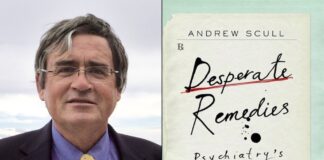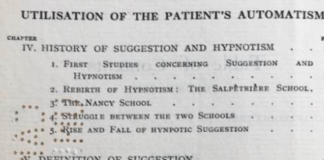Tag: Freud
Andrew Scull—Desperate Remedies: Psychiatry’s Turbulent Quest to Cure Mental Illness
Sociologist and author Andrew Scull discusses the history of psychiatry's "Desperate Remedies," from lobotomy and the asylum to the failures of today's drugs and the fads of ketamine and deep brain stimulation.
What Trump Could Learn From Anna Freud About Parentless Kids
From Daily Beast: "Seventy-five years ago in the midst of World War II, Anna Freud, the daughter of Sigmund Freud, and her close friend,...
How Midcentury Arab Thinkers Embraced the Ideas of Freud
In this piece for Aeon, Omnia El Shakry highlights the role that Freudian ideas and psychoanalysis played in midcentury Arab literature, education, politics, and culture.
"For some,...
Video Games on a Psychoanalyst’s Couch
From Asia Times: In his new book The Playstation Dreamworld, Alfie Brown discusses the role of video games in both reinforcing and challenging capitalism through the...
Anti-Freud: Karl Kraus’ Criticism of Psychoanalysis and Psychiatry
In this piece for Psychiatric Survivors, John C. Hancock discusses the work of Karl Kraus, who was praised by Thomas Szasz as one of the greatest...
The Great Psychoanalysts 2: Melanie Klein
This piece for The Philosophers' Mail profiles Melanie Klein, a Viennese psychoanalyst best known for applying the principles of Freudian psychoanalysis to children. Klein's work primarily focused...
Freud: The First Anti-Psychiatrist
Freud showed disdain for psychiatrists — he saw their untruthfulness and harmfulness. An antidote for the medical model’s infestation of our culture would be to reintroduce some of Freud’s theories to the public. After all, wouldn’t the medical model’s opposite be the best means of counteracting it?
Freud in the Scanner: A Revival of Interest in Introspection
From Aeon: For the past several decades, mainstream mental health professionals as well as the general public have dismissed Freud's ideas, turning instead to neuroscience...
Pierre Janet and the History of Psychological Treatments
In this piece for Holistic Elephants, Bernard Guerin discusses Pierre Janet's book Psychological Healing: A Historical and Clinical Study, which describes a variety of mental health...
Susie Orbach and Frederick Crews Debate Freud’s Legacy
In this piece for The Guardian, Frederick Crews, author of Freud: The Making of an Illusion, debates with psychoanalyst Susie Orbach about the merits of Freud's...
The Curious Conundrum of Freud’s Persistent Influence
From The New York Times: Frederick Crews' new book The Making of an Illusion portrays Freud as relentlessly self-interested, irredeemably immoral, and interminably mistaken. Perhaps Crews...
Freud the Philosopher
From Aeon: In addition to creating the discipline of psychoanalysis and developing psychological theories, Freud played a major role in challenging the common philosophical assumptions...
What Lurks Beneath
In this piece for Aeon, Antonio Melechi explores various historical and contemporary perspectives on the nature and purpose of the unconscious mind.
Why Freud Still Isn’t Dead
From Scientific American: Psychoanalysis persists as an important form of mental health treatment despite decades of relentless criticism and the rise of both psychopharmacology and cognitive...
Victim Blaming: Childhood Trauma, Mental Illness & Diagnostic Distractions?
Why, despite the fact that the vast majority of people diagnosed with a mental illness have suffered from some form of childhood trauma, is it still so difficult to talk about? Why, despite the enormous amount of research about the impact of trauma on the brain and subsequent effect on behaviour, does there seem to be such an extraordinary refusal for the implication of this research to change attitudes towards those who are mentally ill? Why, when our program and others like it have shown people can heal from the effects of trauma, are so many people left with the self-blame and the feeling they will never get better that my colleague writes about below?























